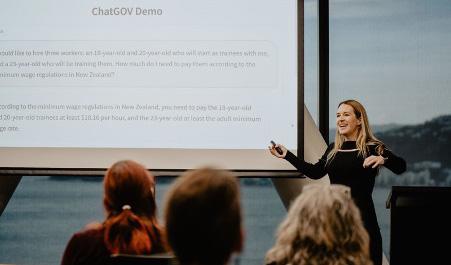
10 minute read
What’s the future of recruitment
Sam Collins, Managing Director of recruitment company People&co, and Dr Amanda Williamson, Generative-AI Lead at Deloitte New Zealand, discuss the impacts and challenges of artificial intelligence in HR and recruitment.
AN INTRODUCTION TO CHATGPT: FROM SCEPTICISM TO BELIEF
SAM: I remember when I first hit the ‘Try ChatGPT’ button on OpenAI early in December 2022, wanting to see what all the fuss was about. After a few minutes of plugging in the standard questions that a quick Google could easily tackle (How tall is the Eiffel Tower? What’s a good cheese scone recipe?), my partner and I decided to ask something a bit harder: the central question to my partner’s Master’s thesis. The response that came back was eerily close to the argument and rationale she had laid out a few years prior as part of obtaining her degree. It wasn’t just a straight regurgitation of her work, and some parts of it didn’t pass closer scrutiny, but that was the lightbulb moment for me where I realised this technology, which had been filed in my mind as ‘science fiction’, was now looking a lot more like it belongs under ‘reality’.
AMANDA: People from all walks of life are realising the benefits of AI, and generative AI tools are increasingly being used as assistants across a wide range of human resource tasks. Such tools have been shown to boost productivity in writing tasks by 59 per cent , even producing highly original ideas , thereby driving more fulfilling work and better client experiences. Generative AI is distinct from the AI that preceded it, because it has democratised access to artificial intelligence. AI is now something we can all leverage, not just computer programmers.
REALISING AI’S SHORTCOMINGS
SAM: In the weeks and months that followed, with more hours spent exploring this new tech (to me, at least!), some of its limitations and shortcomings have become more apparent, and that initial magic has faded somewhat. But I still feel the same sense of awe in thinking about potential applications of this and other similar tech in the not-too-distant future.
AMANDA: Working with generative AI can be like engaging with the world’s best liar. Generative AI can create factually incorrect content, but that sounds correct. It can also pose risks to organisations due to data leakage. Consumer AI tools tend to lack comprehensive data privacy safeguards. Feeding sensitive information, such as CVs, into a generative AI tool like ChatGPT could result in policy breaches and potential legal repercussions. As such, maintaining a mindful approach towards AI usage, and ensuring adherence to trustworthiness principles, is top of mind for many leaders.
AI in HR and Recruitment
SAM: Incorporating AI technology into the HR and recruitment space isn’t a new phenomenon, but it feels like an abundance of platforms and services have been offered to automate, enhance or help manage parts of our roles in the months following the initial release of ChatGPT. What I have found particularly fascinating at the recruitment coal face is the behavioural shifts across our candidates, clients and within our business in response to the rapid induction and widespread adoption of this new technology.
In working with our clients in recent months, I am seeing an increase in concern over screening for AI input in candidates’ work, particularly for technical or creative roles where there is a strong need for a candidate to not just be able to solve a problem but to understand the ‘why’ behind their proposed solution. For example, we recently worked with a client on an engineering role where the successful candidate needed a level of technical capability as well as an understanding of how that capability would mesh with other parts of the organisation. Historically, for these roles, our client would ask candidates to complete an exercise intended to demonstrate their technical competency and to have this submitted alongside their application.
With the prevalence of tools like ChatGPT capable of making light work of these sorts of exercises, our client has adapted their typical interview process to include a separate technical interview panel where candidates will meet in person with experts from within the organisation and will have their answers to that exercise challenged. While this isn’t a new problem –someone perhaps padding their level of expertise or looking externally for the answers – the availability of resources like ChatGPT for crafting answers to problems effectively in real time has meant the need to add this layer of assessment into the hiring process. It’s an interesting contrast to the trend that was accelerated over COVID-19 of remote working and increasingly digital-first engagement, where now there seems to be a shift back to in-person assessment as part of the hiring process.
AMANDA: Interestingly, real-time behavioural interviews are not immune from the influence of generative AI either. There are open-source and consumer tools that enable candidates to input the live transcription of an interview into a generative AI tool. This tool prompts the user with suggested responses to questions, in real-time. The candidate does not even need to touch their keyboard throughout the entire process. Therefore, in addition to the ease candidates now experience when answering technical questions, generative AI might be presenting a very optimistic picture of a candidate’s language and soft skills in video interviews too.
Given the prevalence of remote work, online interviews – and with them, the use of generative AI – are inevitable. With few effective solutions to mitigate AI use, and concerns that methods like exam proctoring could harm diversity and inclusion , a balance must be struck. It’s worth questioning whether complete AI removal is the goal, because its integration could boost productivity, if ethically managed. The future of recruitment may involve reconciling generative AI’s benefits with its capacity for misrepresentation. This evolving area is one to watch.
Our Technological Revolution
SAM: Inside our business, we’ve been going through a small technological revolution over the past year with an overhaul of all our major systems. We’re a boutique recruitment agency, and we market ourselves on the effort and care we invest into the people behind the recruitment process, whether that’s the candidates we are working with or the client that has engaged our services. Our challenge has been in finding a way to blend our traditional recruitment methodology with technology to continue to operate at the ‘cutting edge’, but because our product is people, if we lose that direct engagement and relationship with our networks, we would be losing the soul of our business.
The great news is that this isn’t an ‘all or nothing’ proposition. A vast selection of tools is available to businesses like ours to create technology platform that augments our team’s capability and caters to the specific needs of our market.
AMANDA: The explosion of AI tools in recruitment underlines the critical need for proper training of recruitment consultants to use these tools well. Although AI is often seen as a solution to hiring biases, it can (unknowingly) perpetuate these prejudices if trained on biased data, even when key demographics are removed from candidate profiles. However, when effectively used, AI can aid in identifying a broader spectrum of candidates, potentially reducing bias in hiring processes. Ensuring that staff understand the inherent biases in AI tools and are trained to use generative AI features responsibly can significantly impact the return on investment from AI, and should be an important consideration during AI software adoption.
What Hr Professionals Should Be Thinking About Now To Prepare For More Tech In The Recruitment Space
AMANDA:
Upskill in trustworthy AI: Encourage effective and responsible use of generative AI. Begin with strategic ideation sessions for leaders to adapt to new AI opportunities and associated legal and ethical changes. Equip individuals with prompt-engineering skills for optimal results. Lastly, emphasise trustworthy AI training, highlighting responsible AI use, balancing automation and human supervision, and managing data privacy and algorithmic fairness.
Use generative AI as a first draft only: Generative AI can be likened to an eager intern – highly articulate, but occasionally wildly incorrect. Recognise that these tools can sometimes yield unreliable results that may not accurately represent a candidate’s qualifications or suitability. The optimal use cases are those that help you reduce time spent on effort-intensive tasks but still allow you to fact check its outputs. So for now, double check everything, and avoid using personally identifiable or sensitive information in consumer AI tools. Businesses should only share personal or confidential information if there is explicit confirmation from the AI tool provider that inputted data is not retained or disclosed by it.
SAM:
Embrace change: AI progress represents the latest wave of technological disruption, with far-reaching implications for the HR and recruitment sectors. HR professionals should welcome this transformation and embrace the change it will bring by strategising how to incorporate AI into their current operating models or modify processes to align with the new technological landscape.
Balancing tech and human touch: As we increasingly move to integrate technology like AI into our businesses, we should be mindful of the people who form the heart of our industry and strike a balance between technology-driven efficiency and a process that supports the human factor.
Making Recruitment Consultants More Efficient
SAM: With things like Chatbots, email and text automation and candidate engagement systems, as recruiters, we are being enabled to increase the number of talented candidates we are engaged with at any given point in time. Combine these larger talent pools with candidate-sourcing AI integrated into our core CRM, and we can more readily locate great people from that pool of candidates and engage with them around specific job opportunities, effectively resulting in a faster time to placement for our clients. Rather than replacing our function in the market, advances in this technology are increasing the efficiency of our operating model and providing our team with more capacity to do what they do best and add value by engaging with the people behind the process.
AMANDA: Generative AI has the potential to profoundly enhance traditional recruitment processes across four main stages:
sourcing and screening, analysing vast amounts of data to identify the best fit for a role
assimilating data from diverse sources, like social media, to construct comprehensive candidate profiles
crafting job descriptions, which truly represent the role and company culture
interview scheduling, resulting in significant time and cost savings.
Generative AI also expedites response generation and feedback delivery, instilling a more human-like touch. Consequently, these tools may drive more human-sounding interactions for recruitment consultants and enable skills-based recruitment methods, fostering an environment that cultivates a more inclusive, equitable and diverse talent pipeline.

Sam Collins is the Managing Director of People&co Recruitment, a boutique agency located in Wellington serving clients across the public, private and not-for-profit sectors. Following a successful career in banking and financial services, Sam took over the business from the retiring founders in 2022. He now leads a fantastic team renowned for their ability to connect great people with great employers, in roles ranging from the administrative to the executive.
Dr Amanda Williamson is the Generative Artificial Intelligence Lead for Deloitte New Zealand.
Amanda provides insights on AI, guiding executives in the practical implementation of data-driven strategies, across key industries, drawing on her experience as a senior lecturer in innovation and strategy.
Amanda’s core expertise lies in natural language processing, an area she delved into during her doctoral studies at the University of Sheffield. This expertise underpins recent breakthroughs, such as ChatGPT, and has been instrumental in shaping her professional accomplishments.
www.linkedin.com/in/amandaondata/










